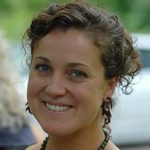 |
March 9, 2017Dr. Annie Rowe, University of Southern CaliforniaEating rocks! Investigating microbial energy conservation with microbes that utilize solid mineral electron donors |
Abstract
The extent to which solid minerals serve as energy/electron sources for microbial metabolism in most environments is largely unknown, due to our limited ability to detects these processes in the environment. This stems from the difficulties associated with culturing microbes with these metabolisms (specifically microbes that utilize solid mineral electron donors), which in turn has limited our mechanistic understanding of the genes, enzymes and diversity of microbes involved, and ultimately our ability to assess suitable biomarkers for these processes. To tackle this limitation, my work has focused on utilizing electrochemical techniques to aid in our ability to culture microbes capable of electron uptake from solids—in essence, microbes that eat rocks. Using an electrode poised at specific reduction/oxidation potentials to mimic minerals and/or conditions that allow microbial electron uptake and limit abiotic reactions, I enriched and isolated several strains of microbes capable of gaining electrons from insoluble minerals. In this talk I will discuss the isolation of these microbes, as well as our preliminary characterization of their genomes, metabolic capabilities, and electrochemical properties. I will also highlight electrochemical techniques I am developing to study respiration under non-growth conditions, and the implications of this work for studying survival in carbon limited environments.
Speaker Biography
Dr. Rowe received undergraduate degrees from UC Berkeley in Molecular and Cellular Biology and Microbiology. She attended graduate school at Cornell University working in the lab of Dr. Ruth Richardson on anaerobic reductively dehalogenating microbial communities. She received her Ph.D. in Microbiology, with minors in Genomics and Environmental Engineering. Working in the Lab of Ken Nealson as a C-DEBI postdoctoral fellow, she pursued understanding the mechanisms of electron uptake in bacteria including: a model system for understanding extracellular electron uptake (Shewanella) as well as environmental microbes enriched using electrochemical techniques. She is now a postdoctoral fellow for the NASA Astrobiology institute Life Underground team, where she continues to work on electron uptake (in Methanogenic microbes) and electrocultivation in subsurface environments (Sanford Underground Research Facility).

